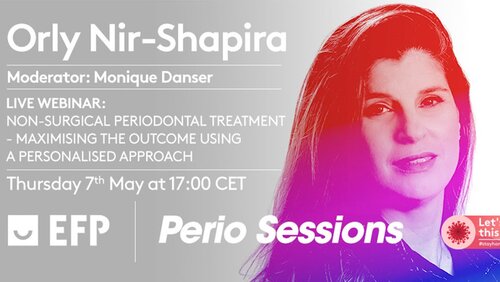![]()
11 May 2020
Orly Nir-Shapira’s Perio Sessions webinar showed how personalised approach can maximise benefits of non-surgical periodontal therapy
Categories:Clinical Practice, Communication, Education

In the fourth EFP Perio Sessions live webinar, which took place on 7 May, Israeli periodontist Orly Nir-Shapira explained how mapping individual risk factors could shape treatment protocols and enable periodontists to tailor their treatments to individual patients.
In this webinar, Dr Nir-Shapira illustrated ways to assess patients’ risk of periodontitis, show what we can expect from conventional non-surgical therapy, and explained how adjunctive therapy can be used effectively alongside non-surgical treatment.
She showed how treatments have evolved from the earlier period (1960-1980) when periodontal surgery was “mandatory” and “it was some kind of a malpractice to not perform surgery on pockets deeper than 5mm.”
Today, she said, “the map of treatment is different, and we can maximise the non-surgical phase and do our best not to go to periodontal surgery if it’s not needed.”
The presenter explained how, with conventional non-surgical treatment, clinicians could expect:
- A reduction of 1mm in pockets of between 4mm and 6mm.
- A reduction of 2.6mm in pockets greater than 7mm.
- A pocket-closure rate of 74%.
- A reduction in bleeding-on-probing (BoP) of 64%.
- Attachment gain of 50% of the change in the probing depth.
However, this was good for the “average patient but not for everyone.” As a result, “we want to be more personalised and focus on the need of a specific patient and we also want to keep it minimally invasive.”
New treatment strategies
Dr Nir-Shapira showed how new treatment strategies could play an important role here and discussed clinical techniques and protocols, systemic antibiotics, local antimicrobials, replacement therapy such as probiotics, lasers and photodynamic therapy, and host modulation.
Highlighting the growing problem of antibiotic resistance, Dr Nir-Shapira said that systemic antibiotics should be prescribed sparingly and only in certain cases, such as patients with periodontitis grade C, patients with diabetes, and smokers.
In terms of host modulation, she focused on the potential use of low-dose tetracyclines and statins as effective adjuncts to non-surgical periodontal treatment.
Concluding her presentation, she said that the three keys to successful non-surgical treatment were evidence-based treatment, mapping patients’ needs and risks, and the minimally invasive approach.
The webinar, moderated by EFP treasurer Monique Danser, was watched live by 924 people in 66 different countries. It is now available for viewing on the EFP Perio Sessions playlist on the federation’s YouTube channel.
View webinar part one View webinar part two View webinar Q&A




